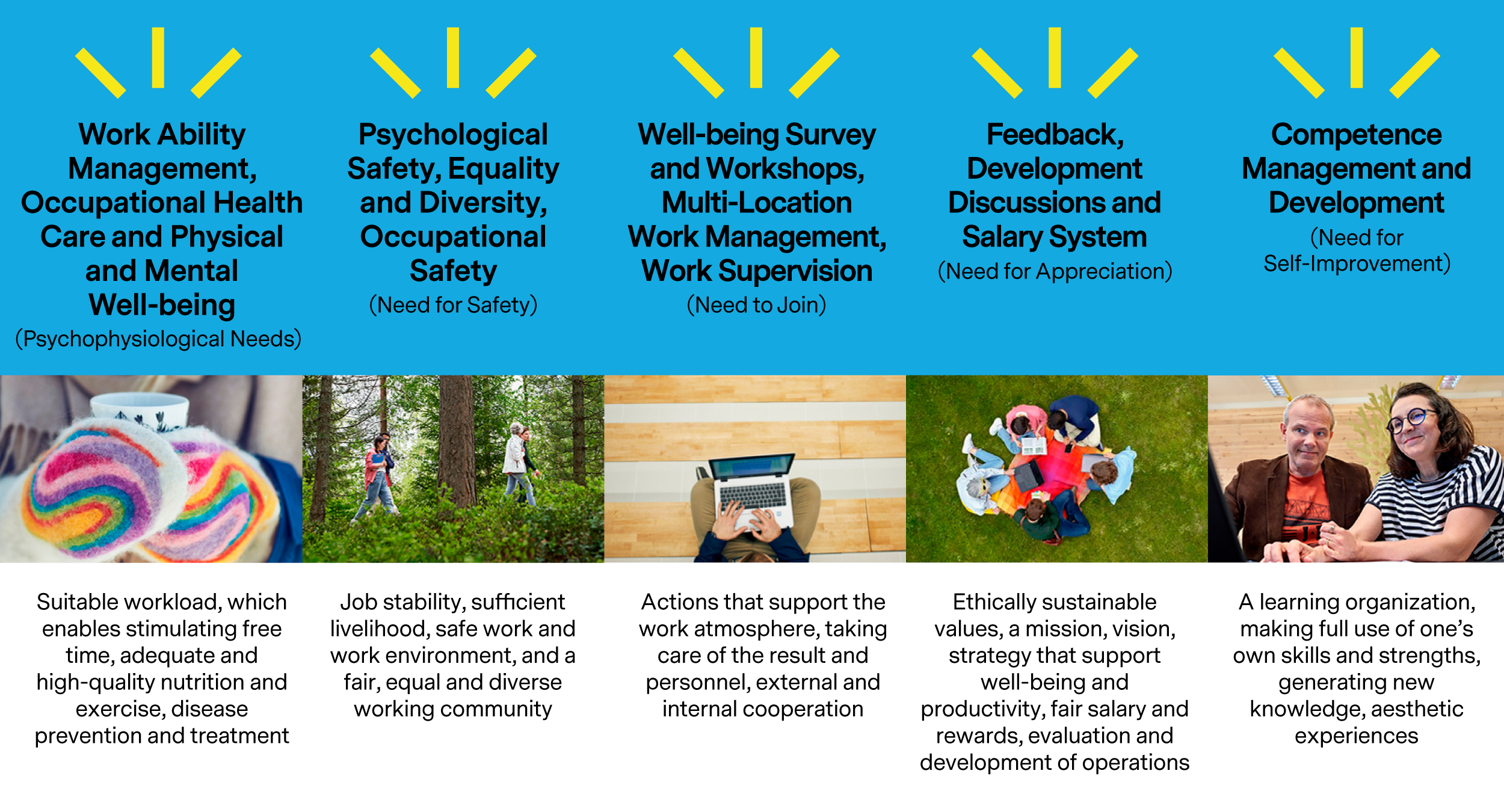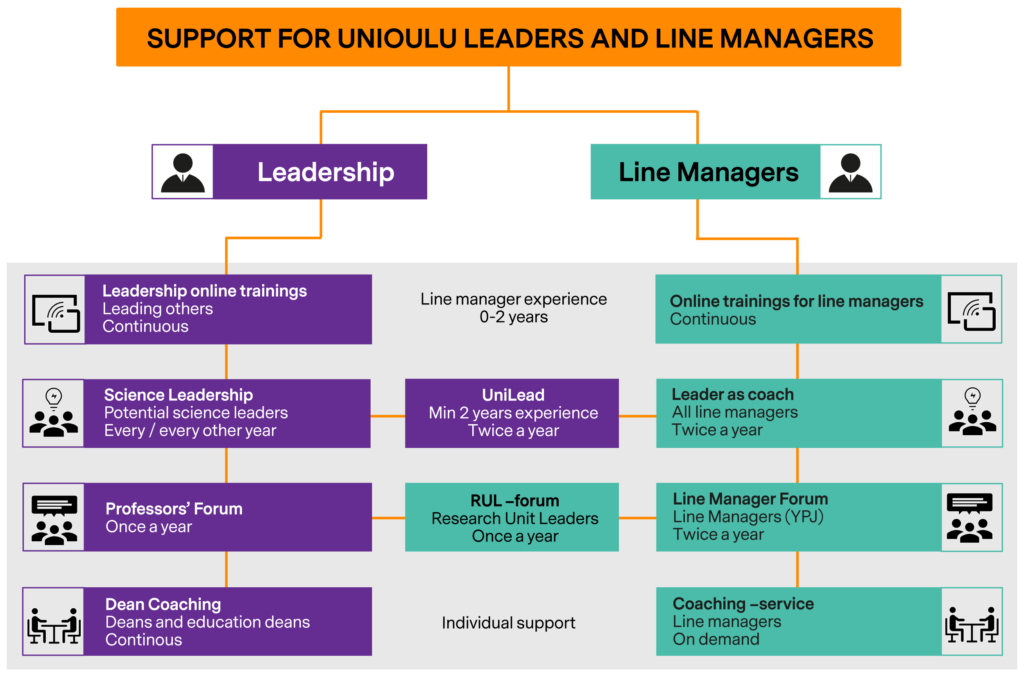Long-term development of line management is evident
According to the audit visit, the Community well-being concept is taken seriously all over the university. Staff members are proud to work at the university with their colleagues, students, and external partners. There are a lot of well-being benefits for staff and practices that promote well-being, for example wide occupational health care including several mental health services, an early support model, employee bicycle benefit, sport and culture benefits. In every faculty, there is an HR manager who supports well-being leadership, and in some faculties there are additional well-being committees or promoters who organise well-being workshops, activities, sports events and activities for families and children. One faculty has established a well-being committee and decided to be the happiest faculty in the world.
A staff well-being survey is carried out at the University of Oulu every other year. Based on the results of the survey, university-level measures are incorporated in the action plan for work-ability management. About two thirds of the staff answer these surveys. Comparing the results from 2021 and 2023, the audit team found that the work ability of the staff had decreased. The audit team recommends that the management and the HR unit keep an extra eye on the well-being of staff, also the third of them who did not answer the well-being survey. There are also signs in the well-being survey results from 2021-2023 that contacts between management and staff have diminished during these past two years. The audit team recommends paying attention to this. The audit team also recommends the university to ensure that the guidelines and forms for development discussions on Patio are used across the university. In addition to the yearly development discussion between members of staff and their line managers, there could be more contact between management and staff in connection with the updated strategy’s goals.
According to the interviews and teacher workshops, line management work at the university has developed remarkably during the last 20 years, with roles and responsibilities clarified. HR supports line managers and training is offered for them. The audit team also notes that the Oulu Science Leadership programme earns to grow and be spread also nationally and internationally.
According to the self-assessment report and the teacher workshop, a heavy workload is a problem recognised at the university. To recommend a solution to this is far beyond the realm of the audit team, but it should become a theme for national and international discussions with other universities. As a member of the European University Association (EUA) the university can lead the way in this huge well-being issue.
Recruitment and equality procedures are in place
The University of Oulu uses a clear procedure for staff recruitment. The procedure has recently been strengthened with a new recruitment system. The recruitment guidelines are aligned with the EU Commission’s Open, transparent, and merit-based recruitment principles (OTM-R). In the recruitment of senior positions and tenure track positions there are always external evaluators involved. The university has an ambition to recruit more international staff. However, 21 % of staff are already international. There is a special guide for international staff on practical issues. According to the audit visit, many of the applicants are internal candidates from the UO. The audit team encourages the university to continue its efforts to attract more national and international talent. One aspect of this is making job descriptions broad enough.
According to the university’s website, the university has put in place systematic procedures to address diversity, inclusion, and equality. The university has an Equality and Diversity Committee, which among other things organises morning coffees to discuss these issues. The university has started to work even harder on undesirable power structures. In addition, a Diversity, Equity, and Inclusion (DEI) expert was recruited and began work at the UO in the beginning of 2023. Actions to promote equality and diversity are publicly outlined and highlighted by the university. The university’s Equality and diversity plan is based on the National Equality Act and the Non-Discrimination Act. The university specifies that people must be treated equally to support well-being in the community, create a sense of inclusion for staff and students, and take care of the social and physical environment. The Equality and diversity plan includes development actions for a two-year period at a time. According to the audit visit, the UNIC cooperation has considered acting on diversity beyond nationality, language, religion, or sexual orientation.
Competence development needs should be further explored
According to the audit visit, the University of Oulu has plans and systematic processes for the competence development of staff in place. The trainings are available in the OSKU system. The Faculty of Education and Psychology provides pedagogical training for all university staff. There is an overarching pedagogical strategy, a Moodle platform, digital pedagogical training, and tutor training for tutors. Recruited teachers need to have pedagogical training completed within two years and completion of these studies is monitored in annual development discussions. According to the audit visit, the University of Oulu does not require their staff to have pedagogical training in the tenure track process.
According to the self-assessment report and the audit visit, it is up to the individual staff member to decide how actively they participate in the development of competence. Individual development discussions between members of staff and their line managers once a year should not be the only way to ensure the competence development needs either for the staff member or for the university and its activities. The audit team recommends that more attention should also be paid to the staff’s internationalisation competences, multicultural competences, and language awareness. The audit team recommends that the competence development needs of the staff should be more closely examined. For example, competence development should be organised in strategic areas where more staff are interested to participate and where development needs exist.

